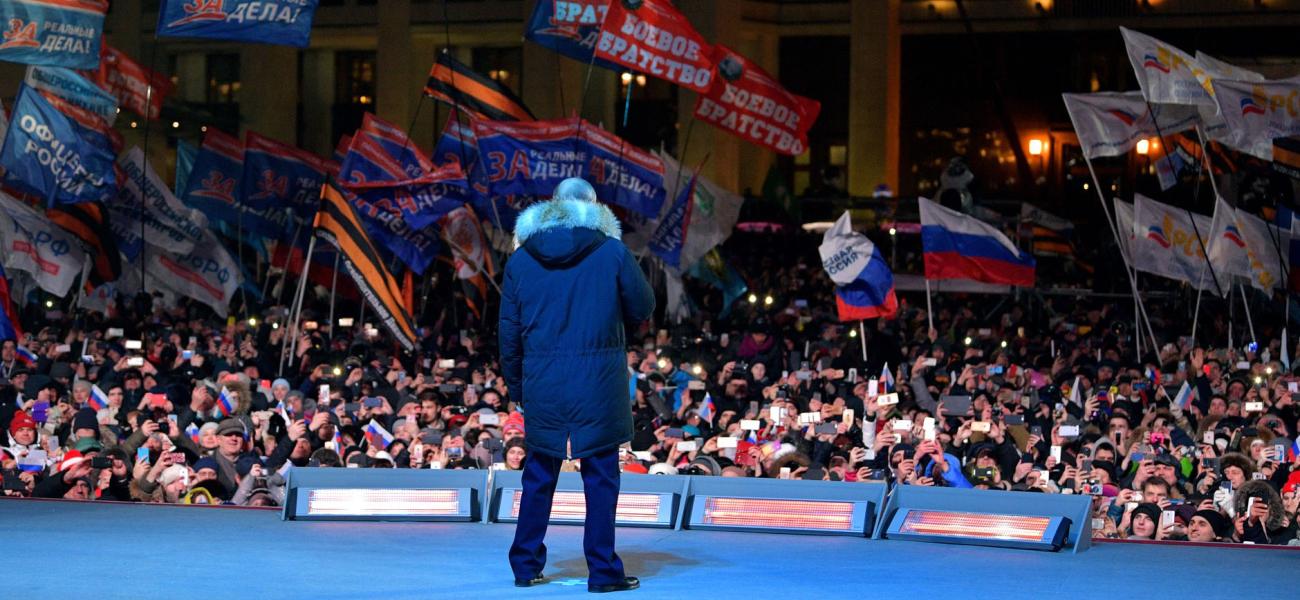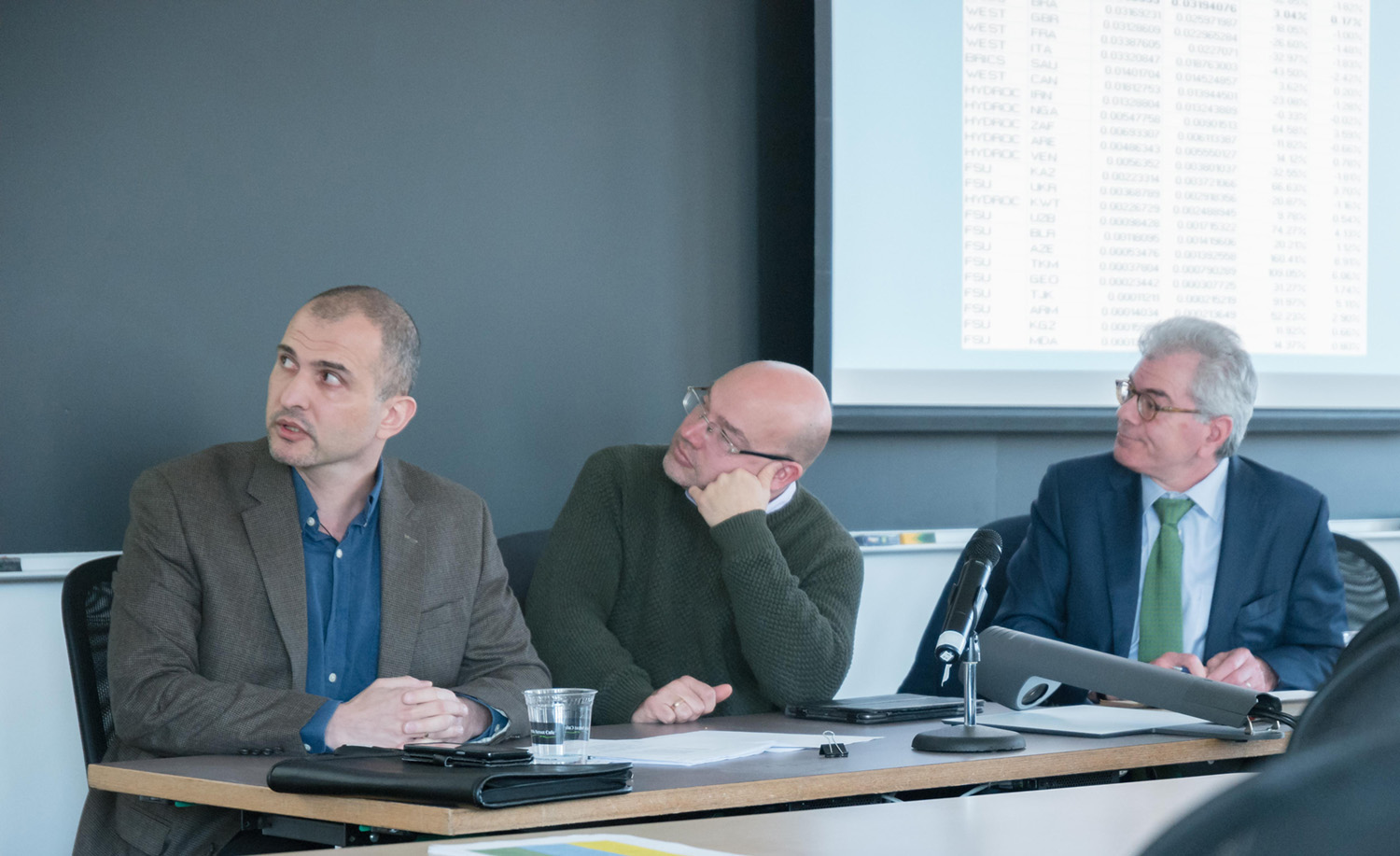In the Thick of It
A blog on the U.S.-Russia relationship
Implications of Putin's Reelection for the Future of US-Russian Relations
The most recent event hosted by Russia Matters focused on Russian President Vladimir Putin’s reelection to a fourth term and what those six years may have in store for U.S.-Russian relations and Russia’s policies toward other countries. Below is a summary of the three speakers’ key points in the order presented (all of them spoke in a personal capacity).
In addition to the remarks below, the speakers raised a number of important questions whose answers were not yet clear. How these questions are answered will shape not only Russia’s policies, but also policies by the U.S. and its allies toward Russia: Will Putin see a prospective successor among the up-and-coming cadre of 40-something Russian officials? How will the questions that concerned his predecessor Boris Yeltsin—namely, guarantees of safety from prosecution and from a loss of assets or privileges after stepping down—play out in the search for that successor? Could the world come a step closer to peace and stability in Ukraine by thinking up a phased approach to deploying peacekeepers along the front lines? Or would Russia be comfortable with the prospect of a “wrecked Ukraine”? And what are other places where Russia has the capacity to use military force to defend its national interests—Belarus? Moldova? Other former Soviet republics?
Roadblocks to Rapprochement
In his presentation, Prof. Nikolas Gvosdev of the U.S. Naval War College reviewed the results of Russia’s presidential elections, which Vladimir Putin won, and explained why expectations of a U.S.-Russian rapprochement under President Donald Trump have proved to be futile. Gvosdev called the results of the March 18 presidential poll sobering for those in Washington who overestimated the weakness of Putin’s regime and Russians’ unhappiness with their president. Looking at the actual election results should throw some cold water on the assumption that Russian opposition politician Alexei Navalny would have won in free elections, according to Gvosdev. Gvosdev pointed out that in regional urban centers, approximate numbers indicate 10-20 percent supported Navalny’s call for a boycott—high enough to say it had an impact, but not enough to be a national movement. In fact, the call for a boycott may have actually hurt Russia’s liberal candidates, he said. Twenty percent voted for the “red/brown” candidates, meaning there is not insignificant support for more socialist, more anti-West ideas, while the liberal candidates did not even break 5 percent. Had a liberal candidate pulled 15-20 percent, indicating a critical mass for the liberal constituency, the post-election conversation would be very different, Gvosdev said. As it is, a reset between Washington and a President Navalny or a President Sobchak is not going to happen.
In his presentation, Gvosdev also explained why such a reset has not materialized in spite of expectations that Donald Trump’s victory in the 2016 U.S. presidential elections would lead to an improvement of U.S.-Russian relations. He said that Russia’s interference in the 2016 U.S. election has created an environment in the U.S. in which one part of the national security establishment rejects the possibility of a relationship with Russia as long as Putin remains in the Kremlin, while another segment believes that Trump cannot be trusted to make concessions to the Russian leader, even if those were needed to advance U.S. interests. This belief has left Trump no flexibility to lift even those sanctions that he has power to lift. There are also sanctions that Trump cannot lift because they are coded in the Countering America's Adversaries through Sanctions Act, Gvosdev said. These sanctions would be binding on every president after Trump until Congress removes these guidelines, which, as illustrated by the Jackson-Vanik amendment, can take many years. Gvosdev also noted that there are a number of additional longer-term factors that prevent a rapprochement between the U.S. and Russia. These include the enduring differences between the U.S. and Russia over the future of Russia’s post-Soviet neighbors in Eastern Europe and the lack of trust between NATO and Russia. These roadblocks have contributed to the failure of rapprochement under Bill Clinton, George W. Bush and then Barak Obama, and they have done so again during Trump’s presidency. Gvosdev also pointed to the ideological differences between Russia and the U.S., which, in his view, did not end with the Cold War.
Little Optimism for Arms Control Cooperation
Gary Samore, Executive Director for Research at Harvard’s Belfer Center, painted a bleak picture for prospects of U.S.-Russian progress on arms control and cooperation on nonproliferation issues. He noted that even prior to Russia’s 2014 annexation of Crimea and Russian election interference in 2016, these prospects were bleak. In 2013, Russia rejected a proposal to discuss further reductions beyond the New START Treaty limits, claiming that it would make the Russian nuclear arsenal more vulnerable to a U.S. first strike, as the U.S. was not willing to accept constraints on ballistic missile defense. Things got even worse in 2014, according to Samore. In July, the U.S. formally accused Russia of violating the Intermediate-Range Nuclear Forces Treaty by allegedly testing an intermediate-range land-based cruise missile and Russia responded with its own accusations. Also in 2014, the Obama administration decided to punish Russia over the Ukraine conflict by freezing bilateral cooperation on nuclear energy and Moscow retaliated by cutting off cooperation on nuclear security. Additionally, Samore noted, that by the end of the Obama administration, the U.S. launched an ambitious program to modernize its nuclear triad. Moscow was bound to view this as a threat, even though Russia has been modernizing for years. The only bright spot was U.S.-Russian cooperation on the Iran nuclear deal. However, Samore said, under Trump, even this cooperation is now in jeopardy. If Trump withdraws from the deal in May, this will create another source of conflict with Moscow, except in this instance, Russia and the European Union will be on the same side. The Trump administration has also approved a Nuclear Posture Review that builds upon Obama’s modernization effort, but also suggests that the U.S. would develop a new submarine launched cruise missile so that it can be traded in exchange for Russia’s renewed compliance with the INF treaty. However, Russia is not likely to find that an attractive offer, Samore said. The Trump administration is also taking steps to expand missile defenses again North Korea. With respect to North Korea, the Trump administration sees Russia as irrelevant or obstructionist. Trump’s potential meeting with Kim Jung Un could produce a diplomatic breakthrough, creating a new opportunity for U.S.-Russian cooperation, but Samore believes such a development is unlikely. Samore concluded by saying that under the circumstances, there is little reason to be optimistic, but Russia and the U.S. do still have a very strong common interest: to maintain strategic stability and reduce the risk of conflict that could lead to mutually destructive nuclear war. To minimize that risk, it is important to institute regular military-to-military “deconfliction” channels in Europe and Syria and to continue strategic dialogue. It is also very important to preserve the New START Treaty and prepare for its possible five-year extension in 2021, he said.
The Influence of National Power
Simon Saradzhyan, director of the Russia Matters Project, examined how changes in national power might have affected Russia’s foreign policy changes under Putin. Saradzhyan based his presentation on a report that he has drafted with Nabi Abdullaev of Control Risks’ Russia and CIS division. The report uses several methods of measuring national power to establish that Putin’s Russia has declined vis-à-vis China, but has risen vis-à-vis the U.S. and several other Western countries. The report argues that Russia’s decline vis-à-vis China and its rise vis-à-vis Western competitors in the 21st century could have been among the factors that made Moscow more accommodating toward the Middle Kingdom, on one hand, and more assertive in its competition with the West in the post-Soviet neighborhood, on the other hand. However, while Russia has outperformed the U.S. and several Western countries in terms of the rate of growth of national power in the 21st century, it continues to lag behind the U.S. in terms of absolute volume of national power, according to the measurements by Saradzhyan and Abdullaev. Moreover, some of the sources of the recent growth in Russia’s national power relative to Western competitors are finite and that growth may peter out unless Putin launches deep structural reforms needed to improve the country’s economic and demographic performance, according to Saradzhyan. If Russia’s national power declines significantly, Russia may become more accommodating to the West, but it would still continue to oppose a world order in which the U.S. would be the sole hegemon.
Top photo by Kremlin.ru shared under a CC BY 4.0 license. Event photo by Benn Craig.
The opinions expressed in this blog post are solely those of the author.

